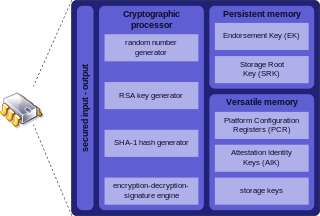
AIX is a series of proprietary Unix operating systems developed and sold by IBM for several of its computer platforms. Originally released for the IBM RT PC RISC workstation in 1986, AIX has supported a wide variety of hardware platforms, including the IBM RS/6000 series and later Power and PowerPC-based systems, IBM System i, System/370 mainframes, PS/2 personal computers, and the Apple Network Server. It is currently supported on IBM Power Systems alongside IBM i and Linux.

An operating system (OS) is system software that manages computer hardware, software resources, and provides common services for computer programs.
Pretty Good Privacy (PGP) is an encryption program that provides cryptographic privacy and authentication for data communication. PGP is used for signing, encrypting, and decrypting texts, e-mails, files, directories, and whole disk partitions and to increase the security of e-mail communications. Phil Zimmermann developed PGP in 1991.

The X Window System is a windowing system for bitmap displays, common on Unix-like operating systems.

macOS Server, formerly Mac OS X Server and OS X Server, is a series of Unix-like server operating systems developed by Apple Inc., based on macOS and later add-on software packages for the latter. macOS Server adds server functionality and system administration tools to macOS and provides tools to manage both macOS-based computers and iOS-based devices.

GNOME Files, formerly and internally known as Nautilus, is the official file manager for the GNOME desktop. Nautilus was originally developed by Eazel with many luminaries from the tech world including Andy Hertzfeld (Apple), chief architect for Nautilus. The nautilus name was a play on words, evoking the shell of a nautilus to represent an operating system shell. Nautilus replaced Midnight Commander in GNOME 1.4 (2001) and has been the default file manager from version 2.0 onwards.

GNOME Evolution is the official personal information manager for GNOME. It has been an official part of GNOME since Evolution 2.0 was included with the GNOME 2.8 release in September 2004. It combines e-mail, address book, calendar, task list and note-taking features. Its user interface and functionality is similar to Microsoft Outlook. Evolution is free software licensed under the terms of the GNU Lesser General Public License (LGPL).

GNUnet is a software framework for decentralized, peer-to-peer networking and an official GNU package. The framework offers link encryption, peer discovery, resource allocation, communication over many transports and various basic peer-to-peer algorithms for routing, multicast and network size estimation.

A software protection dongle is an electronic copy protection and content protection device. When connected to a computer or other electronics, they unlock software functionality or decode content. The hardware key is programmed with a product key or other cryptographic protection mechanism and functions via an electrical connector to an external bus of the computer or appliance.

CUPS is a modular printing system for Unix-like computer operating systems which allows a computer to act as a print server. A computer running CUPS is a host that can accept print jobs from client computers, process them, and send them to the appropriate printer.

Trusted Platform Module is an international standard for a secure cryptoprocessor, a dedicated microcontroller designed to secure hardware through integrated cryptographic keys. The term can also refer to a chip conforming to the standard.

GNOME Keyring is a software application designed to store security credentials such as usernames, passwords, and keys, together with a small amount of relevant metadata. The sensitive data is encrypted and stored in a keyring file in the user's home directory. The default keyring uses the login password for encryption, so users don't need to remember another password.

Linux is a family of open-source Unix-like operating systems based on the Linux kernel, an operating system kernel first released on September 17, 1991, by Linus Torvalds. Linux is typically packaged in a Linux distribution.
HAL is a software subsystem for UNIX-like operating systems providing hardware abstraction.
There are a number of security and safety features new to Windows Vista, most of which are not available in any prior Microsoft Windows operating system release.

FreeBSD is a free and open-source Unix-like operating system descended from the Berkeley Software Distribution (BSD), which was based on Research Unix. The first version of FreeBSD was released in 1993. In 2005, FreeBSD was the most popular open-source BSD operating system, accounting for more than three-quarters of all installed simply, permissively licensed BSD systems.
Remote Desktop Services (RDS), known as Terminal Services in Windows Server 2008 and earlier, is one of the components of Microsoft Windows that allow a user to take control of a remote computer or virtual machine over a network connection. RDS is Microsoft's implementation of thin client architecture, where Windows software, and the entire desktop of the computer running RDS, are made accessible to any remote client machine that supports Remote Desktop Protocol (RDP). User interfaces are displayed from the server onto the client system and input from the client system is transmitted to the server - where software execution takes place. This is in contrast to application streaming systems, like Microsoft App-V, in which computer programs are streamed to the client on-demand and executed on the client machine.
This is a comparison of online backup services.

Linoma Software was a developer of managed file transfer and encryption solutions. The company was acquired by HelpSystems in June 2016. Mid-sized companies, large enterprises and government entities use Linoma's solutions to protect sensitive data and comply with data security regulations such as PCI DSS, HIPAA/HITECH, SOX, GLBA and state privacy laws. Linoma's software runs on a variety of platforms including Windows, Linux, UNIX, IBM i, AIX, Solaris, HP-UX and Mac OS X.











